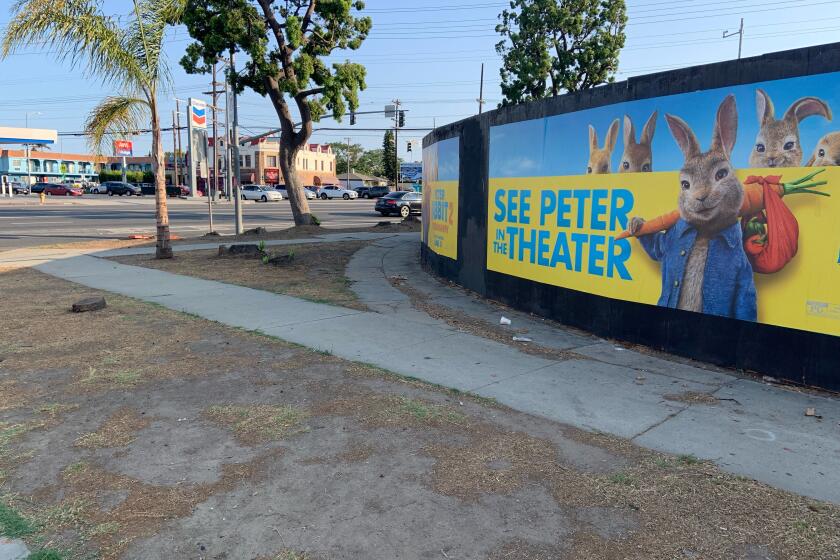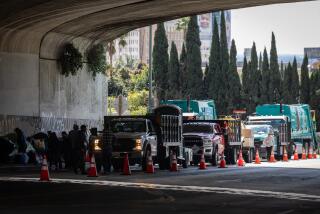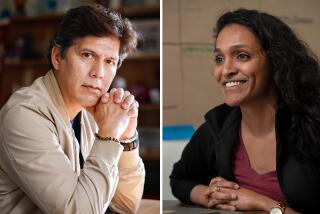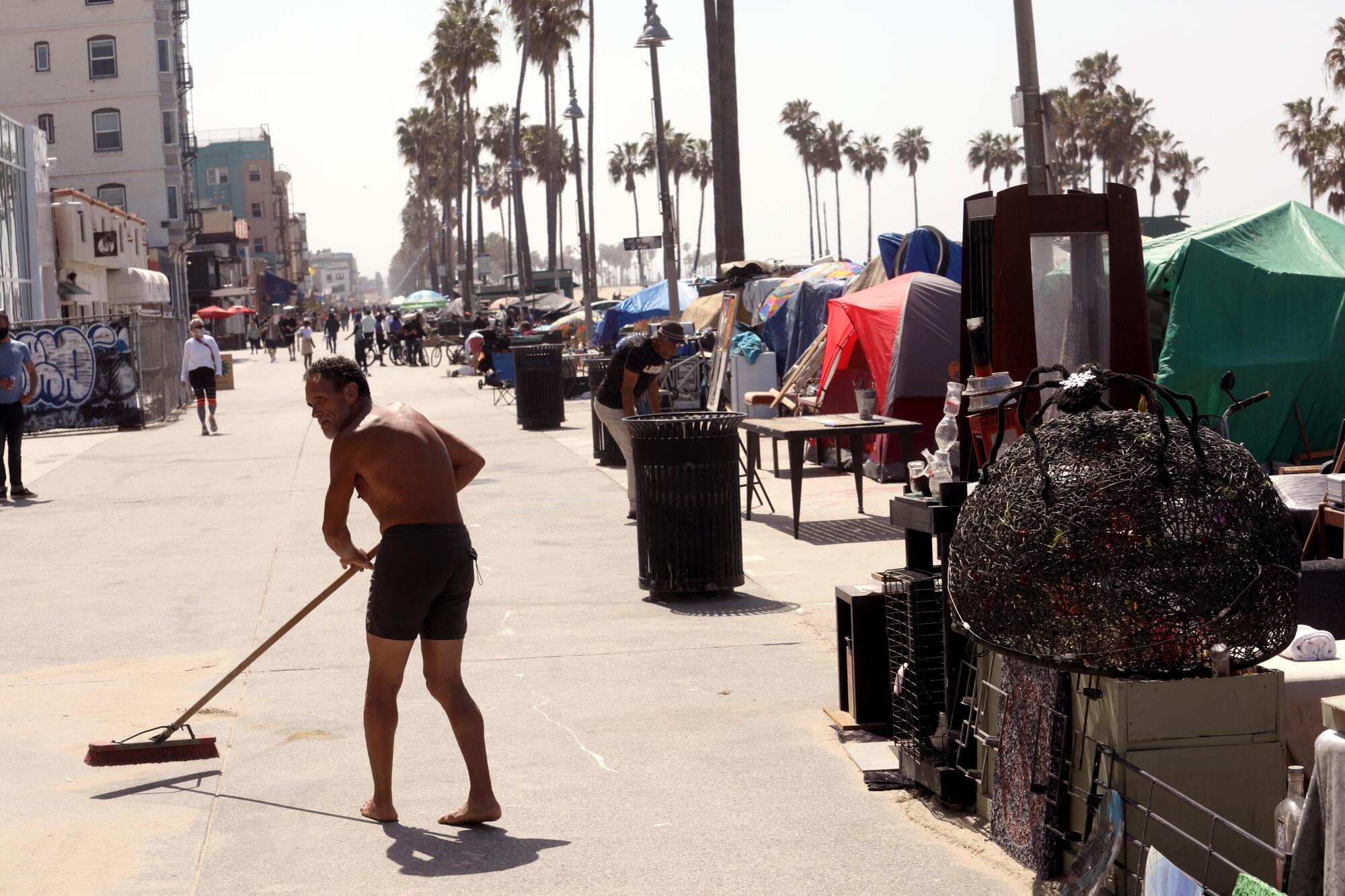
It’s easy to imagine the homeless population as teens escaping abusive families and young adults finding themselves unemployed. There’s another growing demographic in Los Angeles County though: Last year, the number of unhoused people over the age of 62 soared by 20%, to 6,290. Older people now make up almost one-tenth of the county’s unhoused population.
I’ve continued visiting Venice Boulevard, on the Westside of Los Angeles, since presenting the oral histories of some unhoused residents this summer. Three men I met in September and October — 80% of older unhoused people are men — agreed to be interviewed and to share their stories and photos, asking only that their last names not be published. Though each account, of course, reflects a unique life, ultimately everyone in shelters and on the street, whatever their age, has two things in common. All it takes for any American to end up unhoused is to run out of money and to lose access to help from friends and family.
— Robert Karron
Three men recount their family ties, their romances, how they came to live on the street and how they make ends meet.
Frank (Venice Boulevard and Electric Avenue)
My name is Frank, and I’m 71 years old. I feel like I’ve been homeless my whole life, one way or another. But the truth is it’s only been 20 years. I’m from Rhode Island — East Providence. I came here after my wife died; my son was already here, and he offered to help me find a place. But then — I don’t want to get into details — we got in a fight, and he kicked me out. I remember, he told me, “It’s always the same story with you.”
I tell the same stories, over and over. I don’t make anything up. I don’t embellish. If something happened 50 years ago, I’ll tell you what happened. So it’s “the same story.” I think that’s what he meant. Anyway, the police came; they told me I couldn’t come back; I couldn’t even speak to his wife, or to his kids, after that.
Three men recount their family ties, their romances, how they came to live on the street and how they make ends meet.
When I came out here, I started using medical marijuana. That helped me with my opiate addiction. I’d been on opiates for a long time. It started in the Army; this was in ’69. I wasn’t addicted; I just tried them and found — surprise — I liked them, but I could quit, then.
I was posted all over the place. I was in Korea, Colorado, Washington and New Jersey. In Korea I saw wounded people. I can’t talk about that. I’ll get nightmares. I liked the discipline of the Army, and I liked traveling, seeing new things. I liked being a part of something bigger than myself that was defending my country. They trained me to be a carpenter, but they never had me build anything.
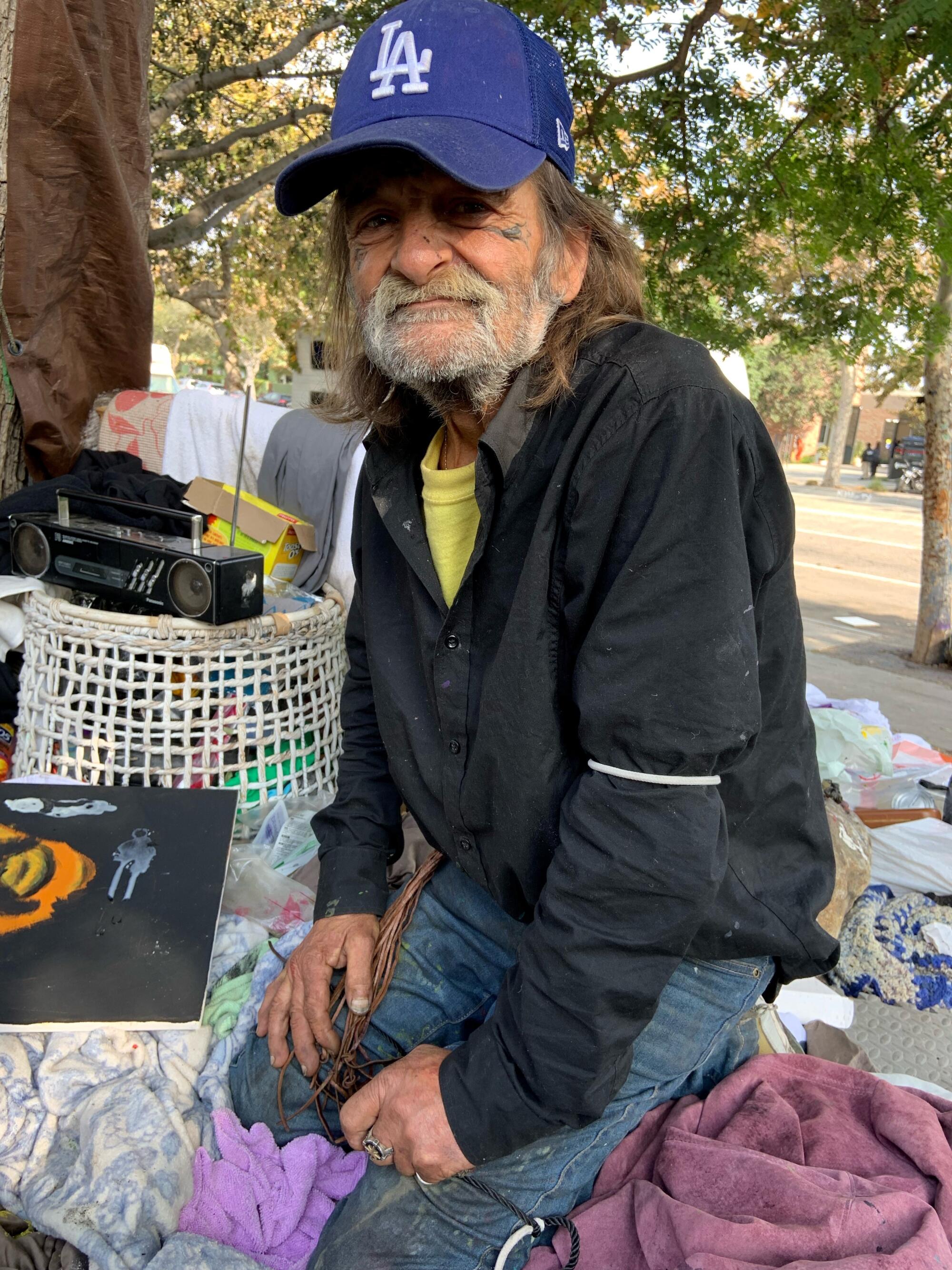
They also trained me to be a firefighter; I ended up using that. Though, at first, I had no training. They just put me in. My first fire, I had no idea what I was doing. I had to go into a building. I froze, at the door. There was black smoke all around — a wall of smoke. I thought: “You messed up. You don’t have any training, and now you don’t know what to do!” I just ran in. I guess it was OJT — on-the-job training. Eventually, I learned: You squirt water around and you hope you don’t blow up in it. There might be someone in there. You have to have that mindset.
When I got out of the Army, I tried to be a firefighter in Providence, but back then, the heads of the fire departments only hired people they knew; you had to have connections. I didn’t have any connections, so I couldn’t get a job as a firefighter.
The Army was my school. I was three years active and three years reserve. I learned a lot. I’m dyslexic; real school was a disaster for me. I couldn’t read. They told me it was my fault.
I taught myself how to read by going over Army regulations. I’m not a great reader — 71 years old, and I still spend an hour reading the newspaper headlines — but I can put words together. You don’t have to know all the words to get their meaning. You don’t have to spell to understand. I read books now. I’ve got some on American history, mystics, and on symbols and signs. I don’t learn anything when I read. Books go over things I already know. I know American history. When I read it, I’m reading what I already know.
I liked the discipline of the Army, and I liked traveling, seeing new things. I liked being a part of something bigger than myself.
— Frank
I had so many different jobs when I got out of the Army. Mainly, I did manual labor. I delivered milk, meat — anything, as long as I got paid. Actually, my first job, when I was 10, was delivering milk. I got a dollar a day. You’d slip and fall on the ice. See, with manual labor, you get injured all the time, and it was because of these injuries that I responded so much to the opiates; they took care of the pain. I still have pain, but I manage it with the medical marijuana.
Eventually, though, I got a better job. I was a chef at so many restaurants. The Village Inn, the Iron Skillet, the Four C’s, Alex’s — there’s more, but they wouldn’t mean anything to you, because they’re all in Providence. I can cook any kind of food, but my favorites are the basics: meat and potatoes, with gravy. I can cook Italian, French; I can make seafood, salads, cakes. Even if I didn’t know how to make something, I could fake it. I was a good chef.
I met my wife, Mary, on a blind date. I was just helping out a friend. He needed someone to take out his date’s younger sister, and I said I’d help. No, he didn’t marry his date. Mary and I had a good time; we didn’t have much money, so we didn’t go on many vacations, but one time we went to Bermuda. We played with the sharks, and we went scuba diving with those iron helmets. The coral reefs in Bermuda are excellent. I almost get chills thinking about them. They’re every color there is.
When I came to L.A., I wanted to start a church. I’m not religious. The times I’ve prayed, God has not once answered me. “God” — everyone has a different idea about that. “God” has enough names to fill a baby book. My church would have been a place for people to get together and talk. You could meet your neighbors, and you could talk to them about anything. You could talk about the things that mattered to you. That’s what I wanted church to be.
William (Venice Boulevard and Washington Way)
My name is William, and I’m 52 years old. I’ve been living here about seven months, but I also lived here before — 30 years ago. There was a 30-year gap because I had to take care of my grandmother, in Texas, after she had triple-bypass surgery. But now we’re getting ahead of ourselves.
I grew up in Texas, but my father was in the military, so we moved around a lot. Besides Texas, I’ve been in Colorado, Oklahoma and England, among other places.
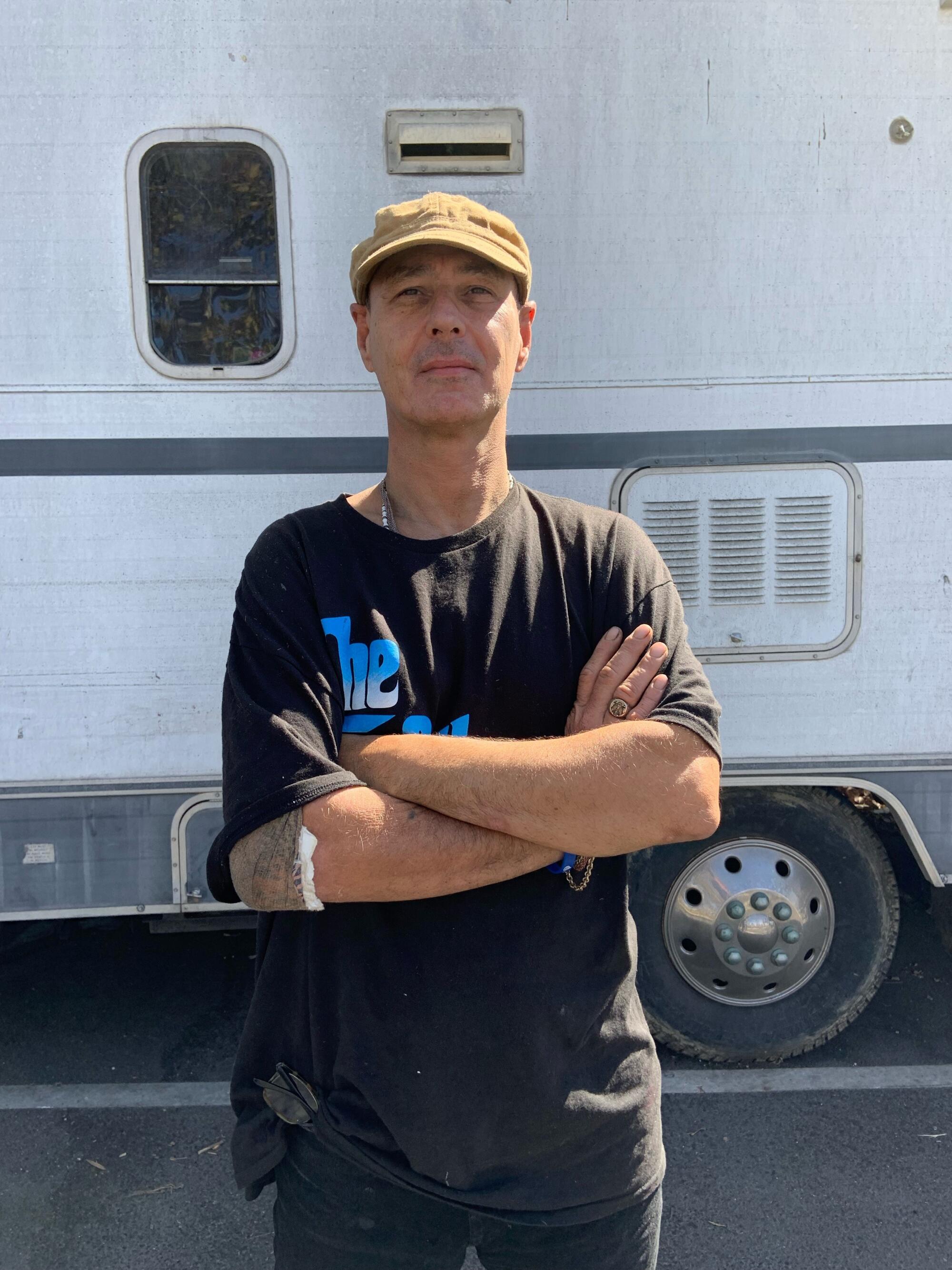
I went to school at the Masonic Home and School of Texas, in Fort Worth. It’s a boarding school for children of Freemasons. I’m a Shriner. The Masons started in England as a union for builders, but eventually it became a charity; they teach you how be a philanthropist. As the Shriners say: “Stay in due bounds with all mankind.”
I came here in 1990. I checked into the Vine Lodge, which is right down the street from Capitol Records. First I was a janitor. But there was an assistant manager opening and, though I’d just turned 21, I took it. Incidentally, I was at this hotel because I had a voucher from Weingart, a program that houses homeless people. We need more of that now.
One day I applied to Capitol Records’ internship program, and I was accepted. Soon they asked me to be a freelance talent scout. I hung out in Venice for that. A lot of bands started here. Green Jelly, Jane’s Addiction, the Gin Blossoms, Soul Asylum and the Red Hot Chili Peppers — they were all here; I actually assisted on the video of “Under the Bridge.” I’m near Anthony Kiedis, when he’s walking down that street. It was a hippie community of musicians then; they were all friends.
If I had a poster, it’d say “Keep Venice Weird.” Shopping — you can do that anywhere. The ocean’s close to everywhere in California — you can swim in it anywhere. But the eccentric people used to be here and should still be. I remember the cowboy in his underwear, and the guy playing guitar in the turban. But then they cleaned that up. Now Venice is boring.
One day I saw an ad for a class that’d teach you how to make a radio show. It was $700; I paid it in installments. They liked me. They said I had a good radio voice; they were charmed by my Texas twang. I said, if y’all want me to do a radio show, I’ll do one called “That’s Rock.” I’d interview bands from around town; I knew them from working at Capitol. But in return, I said, I want to do a show about gay and lesbian issues. I called it “TGLI”: Today’s Gay and Lesbian Issues.
I interviewed people in ACT UP/LA, and we talked about the club scene. My line was, if you’re going to do drugs, do them responsibly. If you’re going to have sex, have it responsibly. I was really big into anti-HIV, anti-AIDS then. I’d buy huge amounts of condoms and lube and I’d just bring them to bars.
After a while I actually became a member of the West Hollywood Chamber of Commerce. I gave out plaques for gay couples who’d been together five years. You stayed together that long, I gave you a bronze plate with your name on it. You stayed together 20 years, you got a silver plate. I found three couples who’d been together almost 42 years, and I gave them a really nice plate that cost me a bunch.
I didn’t like the fact that people were just meeting up and then it was over. I was big on building relationships. If you’re going to change the way people perceive gays, you’ve got to work in a way they understand, and they understand couples and love. Love is love; people understand that.
Force unregulated is wasteful, and that’s what leaders do when they don’t use their power for good. Like the homeless. There’s plenty of money for it, but is it coming here, where it’s supposed to?
— William
After Capitol Records, I took a course on massage and physical therapy downtown. Opened up three businesses for that. I worked with veterans hospitals, and it was going well. But then I left town because of my grandmother. A great woman. Everything I am, I owe to her…. After she died, I made my way to Colorado, and I got my contractor’s license.
I was contracting when COVID-19 hit. The company went under. I had 236 contracts in Colorado, and they all got dropped, because the government said you had to stay in your house. Which was the right thing to do for health reasons, but it ruined my business.
Just eight months ago I was in a high-rise in downtown Denver; the building was so fancy it had a puppy salon. I sold everything, bought a Chevy Tahoe, loaded it up and came back here. When I got enough money together, I bought this RV.
I’d like to transfer my license so I could be a contractor here, but that costs money. My lover is 61 years old, and he’s on welfare. I don’t want to be on welfare. We’re struggling. I work when I can. We met in Colorado; we’ve been together two years.
I’ve always wanted to work. That’s an idea I got from the Masons. They have a saying: You burn gunpowder in the open, it smokes up and goes away, but if you put it behind something, constructive, controlled, you can move mountains. Force unregulated is wasteful, and that’s what leaders do when they don’t use their power for good. Like the homeless. There’s plenty of money for it, but is it coming here, where it’s supposed to? No. It’s going other places; it’s wasted. There’s money, but no one’s channeling it; no one’s using it as it was meant to be used. You’re not creating an environment where it can be used responsibly.
Charlie (Venice and Abbot Kinney boulevards)
My name is Charlie, and I’m 61 years old. I was born in Alhambra, and I grew up nearby, in Walnut. I lived with my family there until they kicked me out. There were domestic issues; they said they didn’t want me around anymore.
In general, I’m not a violent person — but sometimes, when I was with them, I’d do things. Like, one time, I threw a book across the room. One time, when I was in the garage, I kicked a bucket. You could say I have a history of throwing chairs and breaking chairs against walls.
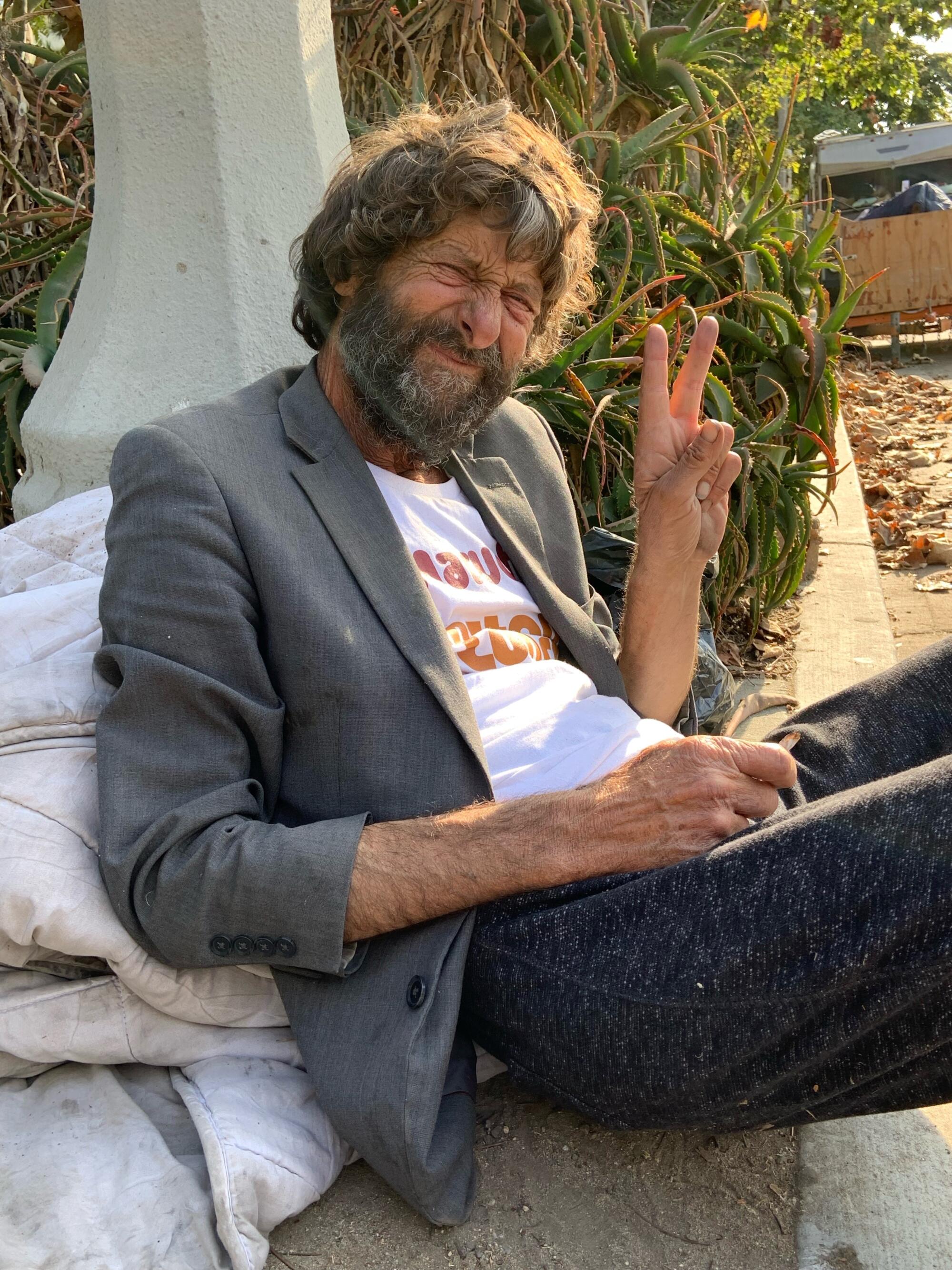
I have anger within myself. You know that movie, “Anger Management”? I have it. That movie scared me. I didn’t see it; just the preview scared me. But my anger isn’t directed at people. It’s just directed at things like chairs. When I’m with people other than my family, I’m fine, but you know how it is with family. They can get under your skin.
I graduated from Alhambra High School; I liked school because I’m a studious person. I liked being in the library. I’d look at picture books. They had a lot of books about rock ’n’ roll bands. But my favorite thing to do is draw. I like to sketch and paint. I do that now, when I can. I don’t use oils; they’re expensive. I use crayons and pastels and markers. I paint people and seascapes and landscapes. I can paint someone who’s next to me, but mainly I paint from memory. In school, they teach you: You match up the ear of the person with their nose, and you create a person from that. I learned that from a painting class I took in Arcadia. I never finished it; maybe one day I will.
Everyone should take a painting class. You explore paint; it’s creative. I’m still learning about painting and drawing. Every time I paint, I learn more. I also went to Pasadena City College, but I didn’t graduate. I took photography classes. I expressed myself through photos.
I’ve been homeless for about five years, but there was a period of another five years before that when I was also homeless. In between those two times, I tried to live with my family again, but they kicked me out again. You know how they say, “You can’t go home again”? Well, it’s true. Sometimes I’ll stay at a shelter, but only when it’s really cold. I don’t like being in a shelter. They lock you up. You can’t come and go. Also, you can’t smoke, and I like to do that. If I could afford to, I’d smoke a pack a day, but cigarettes are expensive, so I smoke three or four a day. I get butts off the street, and I roll my own.
I don’t have any girlfriends. The last girlfriend I had was when I was in sober living in Montclair.
You know how they say, ‘You can’t go home again’? Well, it’s true.
— Charlie
I brush my teeth every day. I keep my toothbrush and my toothpaste here, in my pocket. That’s all I’ve got on me, besides this blanket. I travel light. I only need the blanket. If I sleep on a piece of cardboard, and I have this blanket, I’m fine. It keeps me warm. I’ve had this one for a while — I found it — but sometimes I’ll buy a blanket. They cost about $20. People give me money — sometimes $10, sometimes $20. That’s how I survive. Sometimes people give me food too. I’ll eat the food that people give me, or I’ll get food from McDonald’s. I just got their coffee. They have a senior discount, so it’s only $1.19.
I try to shower every day, at the showers by the beach — but sometimes it’s so cold, I can’t do that. I wear this bathing suit all the time, so sometimes I’ll just jump in the ocean — up to my knees. I can’t swim, so I don’t go in all the way. Also, it’s dangerous — rip tides. Sometimes, I’ll hold my nose and dunk my head, but most of the time I’m just wading. I walk down there, to the beach, every day. At first, it seemed like a long way. You think a trip is long, but after you do it a few times, it seems shorter each time. After a while, it’s easy. That’s just how it goes.
My plan? My plan is to see what happens. I like to think positive. My family used to tell me I’m too self-confident. I think there’s an answer for me — an answer will come to me. I need a new home. Not just a home, but a new one. I can’t go back to the old one.
Robert Karron teaches English at Santa Monica College.
More to Read
A cure for the common opinion
Get thought-provoking perspectives with our weekly newsletter.
You may occasionally receive promotional content from the Los Angeles Times.
